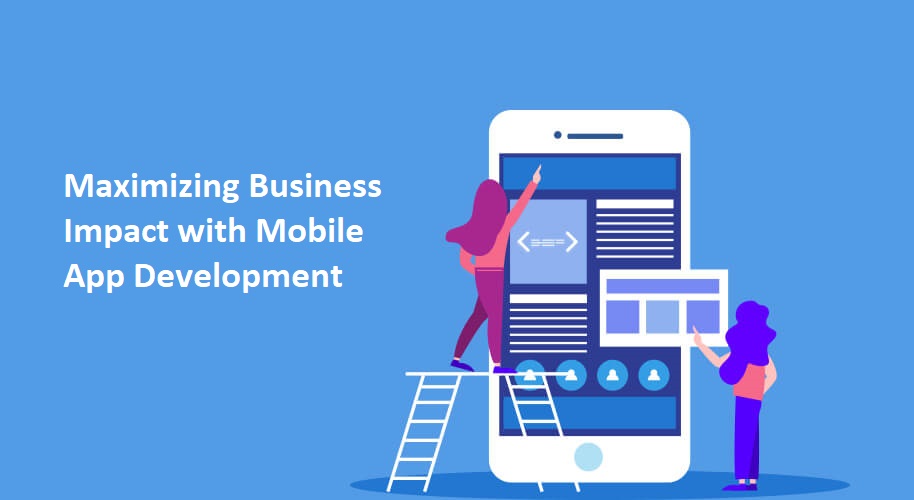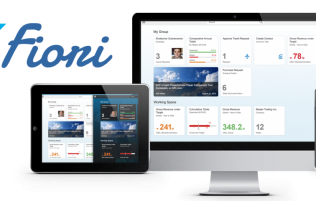Blog
Maximizing Business Impact with Mobile App Development

In the current technological world, having a mobile app for business has become essential. It even helps in rapidly increasing the customer base than the traditional methods. Therefore, this blog presents the key steps to assemble an efficient mobile app influencing the business.
Benefits of Mobile App Development
Improved Customer Engagement
Cellular apps offer a direct and personalized channel for groups to engage with clients. Via features like push notifications and in-app messaging, organizations can ship users relevant actual-time updates, promotions, and statistics. This improved engagement fosters a stronger connection between the brand and its customers, leading to better consumer satisfaction and loyalty.
Enhanced Brand Visibility
The firm’s visibility is clearly very affected by the mobile app in this online world. While users download and use an app often, the emblem’s brand and name are continuously on their device’s screen. This repeated publicity reinforces logo reputation and can boom customer trust and preference.
Competitive Advantage
In a current aggressive enterprise surroundings, staying ahead is essential. A nicely-evolved cellular app can set an enterprise apart by imparting specific functions, higher consumer reviews, and modern solutions. This competitive benefit can lead to expanded market share and purchaser acquisition.
Increased Revenue Streams
Mobile apps may be monetized in various methods, including through in-app advertising, in-app purchases, and subscription fashions. These sales streams can supplement an enterprise’s current profit resources and, in some cases, become a primary source of sales. Moreover, apps can force sales by making it less difficult for customers to purchase or get the right of entry to services, increasing general revenue.
Key Steps in Mobile App Development
Ideation and Conceptualization
The initial stage of mobile app development includes brainstorming ideas and conceptualizing the app’s cause and functions. This section calls for marketplace studies to recognize consumer wishes and alternatives. Clear goals and a nicely-described concept are fundamental for a hit app.
Read more:- Effective Ways To Reach More Customers
Planning and Strategy
As soon as the app notion is hooked up, making plans and strategy come into play. This consists of putting together a budget, allocating assets, and creating a timeline for improvement. A stable method outlines the technical necessities, audience, and key milestones to make certain an easy improvement system.
Design and User Experience
The design stage targets assembling an interactive user interface and enhancing users’ experience. This process assists in making certain that the app is capable of drawing the attention and liking of the users. This method usually includes approachability, responsiveness, and general aesthetics.
Development
The development segment involves coding and programming to deliver the app to reality. Coders work at the app’s capability, integrating the planned features and ensuring compatibility with the chosen technology stack. This stage calls for meticulous attention to element and coding nice practices.
Testing and Quality Assurance
Thorough testing is vital to perceive and remedy any insects or troubles inside the app. This phase includes purposeful trying to make certain all functions paintings as supposed and usefulness trying to assess the consumer revel in. First-class warranty efforts assist in supplying a refined, error-free app.
Deployment
As soon as the app surpasses trying out and pleasant warranty exams, it’s ready for deployment. This entails making the app ready for launch on app stores or distribution platforms. Builders follow app store suggestions and optimize the app’s listing for optimum visibility. A nicely-performed deployment method ensures a successful app launch.
Hiring Mobile App Developers
The Importance of a Skilled Development Team
Building a skilled development team is paramount to the fulfillment of your mobile app project. Skilled developers carry an understanding of coding, hassle-fixing, and innovation, imperative for growing a first-rate app. It is the best decision to hire mobile App developers team as it assists in making sure your app stays competitive and up to date.
Job Descriptions and Requirements
Craft clear and distinctive job descriptions defining the duties and qualifications for every function. Specify the desired skills, programming languages, and enjoy ranges. This readability ensures that applicants understand what’s predicted and approve you to draw applicants who shape your project’s necessities.
Identifying Your Hiring Needs
before you begin recruiting, you must discover your precise hiring wishes. Decide the number of developers required, their knowledge (iOS, Android, the front-cease, lower back-cease), and any extra roles like UI/UX designers or high-quality assurance testers. Align your hiring method with your project’s scope and targets.
Read more:- How to Make a Trending Topics in Social Media by Hashtag
Recruitment Strategies
Think about exceptional recruitment strategies, along with in-house hiring, outsourcing, or offshoring. In-residence teams offer direct control and collaboration; however, they may be more expensive. Outsourcing and offshoring offer fee credit scores but require powerful project management. Pick the method that aligns together with your finances and challenge timeline.
Onboarding and Team Integration
successful onboarding is vital to integrate new hires into your improvement group seamlessly. Provide comprehensive schooling, introduce them to your development approaches, and assign mentors if possible. A collaborative and supportive work environment guarantees new team contributors emerge as productive participants quickly.
Interviewing and Evaluation
behavior thorough interviews to assess candidates’ technical competencies, hassle-solving abilities, and cultural suits. Technical exams and coding checks can assist in comparing their programming prowess. Examine applicants now not only based on their qualifications but also on their enthusiasm for your task and their compatibility with your group.
Mobile App Development Lifecycle
Initiation Phase
The initiation section marks the beginning of the mobile app improvement technique. You outline the mission’s desires, goals, and scope throughout this stage. It is also critical to conduct market research and assess the feasibility of the app’s thinking. This segment lays the inspiration for the complete improvement lifecycle.
Planning Phase
inside the making plans phase, you create an in-depth undertaking layout that outlines the development timeline, budget, and aid allocation. You establish key milestones and deliverables, outline roles and obligations, and set clear expectations. A properly established sketch ensures an easy development procedure.
Design Phase
The sketch segment specializes in developing the app’s consumer interface (UI) and consumer experience (UX). Designers work on wireframes, mockups, and prototypes to visualize the app’s appearance and feel. Collaboration among designers and developers is integral to aligning the sketch with technical requirements.
Development Phase
Development is the core of the mobile app development lifecycle. Developers write code, implement features, and ensure the app functions as intended. Close communication between developers and other team members is essential to address issues and maintain progress.
Testing Phase
The testing section includes rigorous testing to perceive and attach any bugs or problems in the app. Functional checking out verifies that all functions work efficaciously, at the same time as usability trying out assesses the user revel in. Exceptional assurance efforts make sure the app meets high requirements before deployment.
Deployment Phase
The app is ready for launch on app stores or distribution structures in the deployment segment. Builders follow app save guidelines and optimize the app’s list for maximum visibility. A nicely carried out deployment method guarantees a successful app release.
Maintenance and Updates
After deployment, the app requires ongoing maintenance and updates to cope with consumer feedback, restore insects, and adapt to new technology. Non-stop development is essential to preserve the app’s aggressive and applicability in the ever-evolving cell panorama.
Conclusion
In the end, mobile app development gives groups a unique opportunity to interact with clients, beautify brand visibility, and drive revenue boom. Via appreciation of the nuances of app development and adopting satisfactory practices, organizations can unlock their complete ability and stay in advance within the ever-evolving business world.
You may like to read this
-
Admin February 24, 2016

Useful Tips and Guidelines to Make Your Sap Fiori Implementation Successful
The implementation of Fiori is bound to be different from all other long-term implementations in the SAP environment. With the launch of this new UX, SAP altogether addressed the speed, performance and design issues with most SAP apps and projects. Fiori implementation is likely to be quick paced an...
-
Admin January 21, 2016

Peach is the Latest App for iPhone Users
In the recent past, we have seen the rise of social media platforms. Less than a decade ago, there were fewer communication platforms as compared to today. From Viber, Twitter, and WhatsApp all the way to Facebook, there is just no stopping when it comes to this field. From technology news, we can ...


